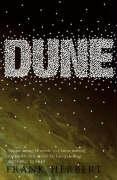BobQuasit reviewed Dune by Frank Herbert (Dune, #1)
Dune: Classic SF adventure on a desert, yet somehow strangely cold
5 stars
There hardly seems to be a point in reviewing a book that's universally recognized as a classic, even outside of the science-fiction genre.
Yet...
I first picked Dune up when I was ten. I was bright (what, you expected me to say I was stupid? Come on!) and in love with science fiction. I'd recently read Asimov's Foundation trilogy, and Dune had been highly praised.
Before very long, I found myself crying and threw the book across the room. It was the first time that something like that had happened to me: the book was simply too hard. I was angry at Frank Herbert for years, and refused to read any of his stuff.
But eventually I read a parody of Dune called National Lampoon's Doon. It wickedly skewered Herbert's complex writing style and dense plots. And yet somehow reading it gave me the urge to try Dune again.
It's indisputably a classic. Herbert wrote on a level that almost no one else had reached, or has reached since: most of his works require hard thinking on the part of the reader. This was incredibly layered, complex stuff. At the same time, it was gripping and hard to put down; Herbert's gift is undeniable.
The story of Paul Atreides, son of a Duke who has been betrayed by his Emperor, is extremely memorable. Arrakis, the Desert Planet, is a setting like no other - Herbert led the way in creating an alien planet that had a fully-realized ecology (Dune could be considered to be science fiction's version of Rachel Carson's Silent Spring). The sociology is advanced and adult, alien as the far future should be and yet plausible. The metaphysics are uniquely challenging and thought-provoking.
The only criticisms that I could make of Dune are that it lacks a certain human warmth. The characters are, somehow, cold; they are sympathetic, but not entirely reachable, if that makes sense. They tend somewhat towards extremes, with a whiff of two-dimensionality. Baron Harkonnen and the rest of the Harkonnens are simply evil, without the slightest hint of redeeming qualities - or, indeed, any other human qualities at all. The Atreides are not necessarily their mirror image, but again, they seem almost idealized. For me, this lays a distancing effect on Dune; I enjoy it, I respect it, I re-read it often...but I do not love it.
Herbert's Whipping Star is much less well-known than Dune, but the protagonist, Jorj X. McKie, is far more accessible; he's funnier and more rounded, with an endearing set of flaws. The book, too, has considerably more humor than Dune. Even though it's not the classic that Dune is, for me Whipping Star is a more enjoyable book.
While I'm at it, I should note that Frank Herbert wrote five sequels to Dune; while the series varied slightly in quality, all the sequels are well worth reading. Not so the additional sequels and prequels by Frank's son, Brian Herbert. They are in every way the utter opposite of Frank Herbert's style: dull, flat, simplistic, and an outright insult to the intelligence of the reader. Brian Herbert was abetted in his cannibalization of his father's brilliant lifework by a hack named Kevin Anderson. I can only suppose that neither of them is capable of realizing just how contemptible their exploitation of one of science fiction's greatest authors is.

